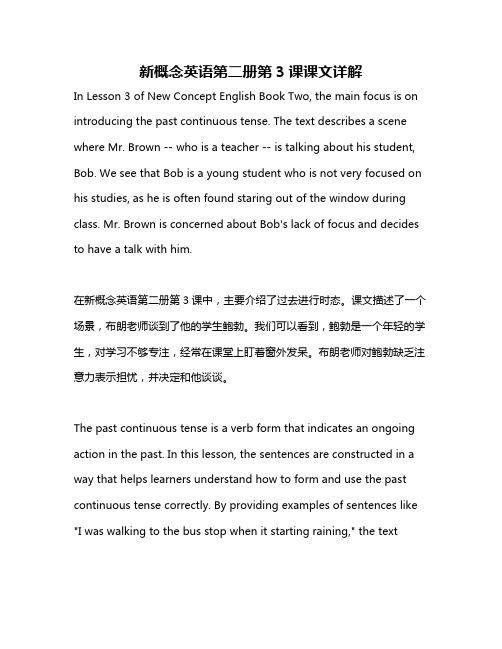新概念二册课文赏析
新概念英语第二册第12课课文详解及语法解析

【导语】学习英语并不难啊。
你还在为英语成绩低拖后腿⽽烦恼吗?不要着急,⼩编为⼤家提供了新概念英语第⼆册第12课课⽂详解及语法解析。
相信加⼊学习当中的你,很快便不再受英语的困扰!还在等什么?和⼩编⼀起来学习吧! 课⽂详注 Further notes on the text 1.Our neighbour, Captain Charles Alison, will sail from Portsmouth tomorrow. 我们的邻居查尔斯·艾利森船长明天就要从朴次茅斯启航了。
(1)这个句⼦以及本课的⼤部分句⼦⽤的是⼀般将来时(cf. 本课语法) (2)句⼦的主语部分our neighbour 和Captain Charles Alison为同位语。
(cf. 第4课语法)下⽂ He will be in his small boat,Topsail 中的Topsail 也为同位语。
2.We'll meet him at the harbour early in the morning. 明天⼀⼤早我们将在码头为他送⾏。
在表⽰时间的短语 in the morning, in the afternoon等前⾯可以再加上early, late等副词,以便更确切地表⽰时间: Tony will arrive late in the afternoon. 托尼下午晚些时候才能抵达。
3.Topsail is a famous little boat. “涛波赛”号是艘有名的⼩艇。
little除了表⽰形体上⼩的意义之外,还含有“可爱”的意思,是个带有感*彩的词。
如little Tom(⼩汤姆)就有⼀种亲昵的味道。
4.It has sailed across the Atlantic many times. 它已经多次横渡⼤西洋。
across 是对某个细长物“横切”、“横断”、“横渡”等,尤指河流、马路等等。
新概念英语第二册第3课课文详解

新概念英语第二册第3课课文详解In Lesson 3 of New Concept English Book Two, the main focus is on introducing the past continuous tense. The text describes a scene where Mr. Brown -- who is a teacher -- is talking about his student, Bob. We see that Bob is a young student who is not very focused on his studies, as he is often found staring out of the window during class. Mr. Brown is concerned about Bob's lack of focus and decides to have a talk with him.在新概念英语第二册第3课中,主要介绍了过去进行时态。
课文描述了一个场景,布朗老师谈到了他的学生鲍勃。
我们可以看到,鲍勃是一个年轻的学生,对学习不够专注,经常在课堂上盯着窗外发呆。
布朗老师对鲍勃缺乏注意力表示担忧,并决定和他谈谈。
The past continuous tense is a verb form that indicates an ongoing action in the past. In this lesson, the sentences are constructed in a way that helps learners understand how to form and use the past continuous tense correctly. By providing examples of sentences like "I was walking to the bus stop when it starting raining," the texthelps students see the difference between simple past and past continuous tenses.过去进行时是一个动词形式,表示过去正在发生的动作。
新概念英语第二册:第72课课文详解及语法解析

【导语】新概念英语⽂章短⼩精悍,语句幽默诙谐,语法全⾯系统。
适合各个阶层的⼈群学习参考。
相信有了新概念英语,你也可以成为“⼤神”级别的⼈物!还在等什么?快来加⼊学习吧!⽆忧考⼩编与您⼀起学习进步! 课⽂详注 Further notes on the text 1.The great racing driver, Sir Malcolm Campbell, was the first man to drive at over 300 miles per hour. 杰出的赛车选车马尔科姆·坎贝尔爵⼠是第⼀个以每⼩时超过300英⾥的速度驾车的⼈。
(1)to引导的不定式短语为 the first man的定语。
类似的可⽤于这种句型的词语有the second, the next/the last以及表⽰级的如 the best, the most intelligent等。
这些词语后⾯可以接名词或one(s),也可以不接: She's always the first to arrive and the last to leave. 她总是第⼀个来到,最后⼀个离开。
You're the best person to advise me about buying a house. 你是我买房⼦的顾问。
the only后必须接⼀个名词或 one(s): You're the only pereson/one to complain. 你是惟⼀抱怨的⼈。
(2)per表⽰“每⼀”、“每”,通常⽤于商业及技术⽤语,⽇常⽤语⼤多⽤ a/an: You can stay at the hotel at£ 10 per person per night. 你们可以每⼈每晚花10英镑住在这家旅馆。
You must have been driving at seventy miles an/per hour. 你刚才⼀定是以每⼩时70英⾥的速度开车。
新概念英语第二册:第34课课文详解及语法解析

【导语】新概念英语作为家喻户晓的经典之作,它有着全新的教学理念,有趣的课⽂内容及其全⾯的技能训练,为⼴⼤的英语学习者提供帮助!如果你也想学好英语,⼜怎能错过新概念英语?下⾯⽆忧考为您提供了相关内容,希望对您有所帮助! 课⽂详注 Further notes on the text 1.Dan Robinson has been worried all week. 丹·鲁宾逊焦虑了整整⼀个星期。
worried 在这⾥可以当成是形容词,表⽰“焦虑的”、“担⼼的”。
worry 也可以作及物动词,表⽰“使担⼼/发愁”等: She appears to be worried by/ about something. 好像有什么事使她发愁。
(⽤于被动语态时,过去分词与形容词意义差不多) 2.the local police,当地警察局。
local 可以表⽰“地⽅性的”或“当地的”、“本地的”: a local newspaper 地⽅性报纸 local news 本地新闻 local shops邻近的商店 3.Dan wondered why he was wanted by the police…丹奇怪警察为什么找他…… (1) wonder表⽰“想知道”时后⾯往往跟疑问词引导的从句:She wondered who that man was/ what had happened. 她想知道那个⼈是谁/到底发⽣了什么事。
(2) want⽤于被动语态时可以表⽰“想与(某⼈见⾯、谈话等)”或“缉拿”、“追捕”: Please wait a minute. I'm wanted on the phone. 请等⼀下。
有我的电话。
This is the man (who is) wanted by the police. 这就是警察在追捕的那个⼈。
4.a smiling policeman ,⼀位⾯带笑容的警察。
新概念英语第二册:第82课课文详解及语法解析

【导语】新概念英语⽂章短⼩精悍,语句幽默诙谐,语法全⾯系统。
适合各个阶层的⼈群学习参考。
相信有了新概念英语,你也可以成为“⼤神”级别的⼈物!还在等什么?快来加⼊学习吧!⼩编与您⼀起学习进步! 课⽂详注 Further notes on the text 1.Fishermen and sailors sometimes claim to have seen monsters in the sea.渔夫和⽔⼿们有时声称看见过海⾥的妖怪。
to have seen是不定式的完成式结构。
不定式的完成式⽤于不定式的动作发⽣在谓语动作之前的情况: I'm sorry to have taken up so much of your time. 对不起,占了你这么长时间。
I'm glad to have met your family. 我很⾼兴见到了你的家⾥⼈。
She seemed to have cleaned the room. 她似乎已打扫过房间了。
不定式的完成式常⽤于believe,declare,find,say,see,know,think,understand等动词后(这些动词常⽤被动语态): She is believed/said/found to have gone to Australia. ⼈们确认/说/发现她已经去了澳⼤利亚。
He is thought/believed to have been killed in an air crash. ⼈们认为他在⼀次空难中丧⽣了。
不定式的完成式与表⽰意图、希望等的动词连⽤时有独特的含义: I meant/intended to have invited him, but I forgot to do so. 我本想/本打算邀请他的,可是我忘记了。
I hope/plan to have finished by 12. 我希望/计划到12点钟以前就已完成。
新概念英语第二册第8课课文详解及语法解析

【导语】学习英语并不难啊。
你还在为英语成绩低拖后腿⽽烦恼吗?不要着急,⼩编为⼤家提供了新概念英语第⼆册第8课课⽂详解及语法解析。
相信加⼊学习当中的你,很快便不再受英语的困扰!还在等什么?和⼩编⼀起来学习吧! 课⽂详注 Further notes on the text 1.Nearly everybody enters for 'The Nicest Garden Competition' each year, but Joe wins every time. ⼏乎每个⼈都参加每年举办的“花园竞赛”,⽽每次都是乔获胜。
(1)nearly和almost 意义相似,表⽰“⼏乎”、“差不多”、“差点⼉”的意思: I'm nearly/ almost ready. 我快准备好了。
I have nearly forgotten his name. 我差点把他的名字忘了。
He nearly missed the train. 他差点没赶上⽕车。
(2)each和every均可译为“每⼀个”,⼆者常常可以互相代替使⽤: Every/ Each time I wash the car it rains. 每次我擦洗汽车,天总是下⾬。
但是each更强调个体。
它常⽤以指⼀个确定的并通常是有限的数⽬: Each child in the school was questioned. 学校⾥的每个孩⼦都被询问过了。
every却不那么强调个体,常⽤来指⼀个⼤的、不确定的数⽬: Every child enjoys Christmas. 所有的/每个孩⼦都喜欢过圣诞节。
另外,each既可以作形容词⼜可以作代词,但every只能作形容词: They each have a share. 他们每⼈都有⼀份。
Each of us has his own work to do. 我们每个⼈都有⾃⼰的⼯作要⼲。
新概念英语第二册:第1课课文详解及语法解析

新概念英语第二册:第 1 课课文详解及语法解析课文详注Further notes on the text1. Last week I went to thetheatre. 上星期我去看戏。
(1)句首的“ Last week ”点明叙述的事情发生的时间是上星期。
所以整篇课文的时态基本上应是过去时(包括过去实行时),直接引语部分的时态除外。
(2)动词go 的原义是离开一个地方去另一个地方,与介词to 连用后,常加上主语所要去的目的地来代表主语的动作目的。
课文中go to the theatre = go to the theatre to see aplay ,即去剧场看戏。
类似的还有go to the cinema = go to the cinema to see a film(去电影院看电影)。
这种表达方式简明扼要。
请注意在以下的短语中名词前通常不加冠词:go to school 上学go to bed 上床睡觉go to church 上教堂,去做礼拜(cf. 第1 册第68 课at school, at church; 第1 册第85 课have been to school/church)2. had a very good seat 座位很好seat 一般指戏院、汽车等配置的固定座位,也能够抽象地表示“座位”或“位子”的概念:the front seat of a car 汽车的前座Take a seat, please. 请坐。
3. The play was very interesting. 戏很有意思。
interesting 属于现在分词形式的形容词,意思是“使人感兴趣”。
它通常与非人称主语连用或修饰某个事物:This is an interesting book/idea.这是一本有趣的书/ 一个令人感兴趣的主意。
4. …were sitting behind me. They were talking loudly.……坐在我的身后,大声地说着话。
新概念英语第二册:第84课课文详解及语法解析

【导语】新概念英语⽂章短⼩精悍,语句幽默诙谐,语法全⾯系统。
适合各个阶层的⼈群学习参考。
相信有了新概念英语,你也可以成为“⼤神”级别的⼈物!还在等什么?快来加⼊学习吧!⽆忧考⼩编与您⼀起学习进步! 课⽂详注 Further notes on the text 1.go on strike,罢⼯。
on strike表⽰“在罢⼯”: The workers are on strike. ⼯⼈们在罢⼯。
It is not clear yet when the teachers on strike will return to theirclassrooms. ⽬前还不清楚罢课的教师何时会回到教室去。
Must we go on strike? 我们必须罢⼯吗? 2.The strike is due to begin on Tuesday. 罢⼯定于星期⼆开始。
due表⽰“预定的”、“约定的”,后⾯可以跟带to的不定式,也可以不跟。
它后⾯通常有确定的时间状语: The plane is due(to arrive)in London at 9 o'clock. 飞机预定9点抵达伦敦。
The performance is due to begin at 7 o'clock in the evening. 演出定于晚上7点开始。
due to后⾯若是名词,则它表⽰“由于”、“因为”(通常⽤于系动词be之后): Our delay was due to the heavy traffic. 我们被耽搁了是因为交通拥挤。
3.…the strike will continue until general agreement is reached about payand working conditions.……此次罢⼯将⼀直持续到就⼯资和⼯作条件问题达成全⾯协议的时候为⽌。
在until引导的时间状语从句中,主语agreement的定语about pay and workingconditions被谓语隔开了。
- 1、下载文档前请自行甄别文档内容的完整性,平台不提供额外的编辑、内容补充、找答案等附加服务。
- 2、"仅部分预览"的文档,不可在线预览部分如存在完整性等问题,可反馈申请退款(可完整预览的文档不适用该条件!)。
- 3、如文档侵犯您的权益,请联系客服反馈,我们会尽快为您处理(人工客服工作时间:9:00-18:30)。
《新概念》英语二册第25课
课文赏析
李正宏
Lesson25 Do the English speak English?
I arrived in London at last. The railway station was big, black and dark. I did not know the way to my hotel, so I asked a porter. I not only spoke English very carefully, but very clearly as well. The porter, however, could not understand me. I repeated my
question several times and at last he understood. He answered me, but he spoke neither slow ly nor clearly. ‘I am a foreigner,’ I said. Then he spoke slowly, but I could not understand him. My teacher never spoke English like that! The porter and I looked at each other and smiled. Then he said something and I understood it. ‘You’ll soon learn
Eng lish!’ he said. I wonder. In England, each man speaks a different language. The English understand each other, but I don’t understand them ! Do they speak English ?
《新概念》英语二册第25课标题是 Do English speak English? 讲述一个外国人第一次坐火车
去伦敦的感受和经历。
一般情况下,我们会把这一课的重点放在并列句连词:Not only……,but……as well以及neither……nor的使用上。
而我在给学生上这一课时,在单词语法讲解之后,则从作者描写一个外国
人第一次来到遥远陌生的大城市时的惶恐、懵懂,甚至有所委屈厌烦的心情入手,讲解文章的修辞手
法和写作用意,带领学生体会这篇英语故事的美妙。
第一句:I arrived in London at last . 一个at last 道出主人公(也就是作者本人)经过
长途颠簸终于到达目的地的旅途艰辛。
At last 的使用既可以表达成功的喜悦,也可以表达艰辛之后
的无奈。
在本文中到底是哪一种呢?作者留下伏笔,让读者带着疑问和好奇继续阅读。
第二句:The railway station was big, black and dark. 我不知道别人在读到这句是想到了什么,反正我是想到了《红楼梦》里刘姥姥进大观园的场景。
Big 、black and dark 三个普通的形容词,看似用来描述大车站,却精准、深刻的描述了主人公此时此刻的心情。
Big:面向一个你认为大的场景,自然感到自己的渺小、自卑和惶恐。
Black:黑色代表沮丧。
Dark:更是暗示主人公心情的黯淡。
有前文的铺垫,后面一句就顺理成章了。
接下来,I did not know the way to my hotel, so I asked a porter. 问路引出一个车站搬
运工。
搬运工,社会最底层人士,但是因为其生活在这个大都市,天生一种优越感。
外地人与本地人相见,会是一种什么场景呢?I not only spoke English very carefully, but very clearly as
well .形象地描写了外地人谨小慎微。
The porter, however, could not understand me. I
repeated my questions several times and at last he understood. 不仅carefully 而且clearly, 还是没能获得理解,多次重复之后,终于听懂了!作者又是如何描述这个作为搬运工的本地人的呢?He answered me, but he spoke neither slowly and clearly. 前面已经折腾了半天,已经知道人家是外地人,英语说得既不慢又不清楚,不是存心的傲慢又是什么呢?鲜明的特点对比跃然纸上。
‘I am a foreigner,’ I said . 作者尽管没用任何副词形容他说的这句话时的神态,我想他一定是in a low voice ,一定不会是loudly, 更不会是firmly. Then he spoke slowly, but I could not understand him. My teacher never spoke English like that !好委屈!The porter and I looked at each other and smiled .两个人都笑了,都无奈的笑了。
这个无奈有两层意思:一个是笑对方,你怎么这么笨呢?另一个在疑问,你在说什么呀?
‘You’ll soon learn English!’he said . “学着点吧!”他说,俨然一副教训人的口吻。
I wonder .我懵了。
In England ,each person speaks a different language. They understand each other, but I don’t understand them!你们英国人可以随意地说英语,可苦了我们这些外国人!这句话如果直译为“在英国,每个人说一种不同的英语,他们彼此能懂,我却不懂。
”就完全失去了作者原文的意境。
最后发出疑问:Do they speak English? 你们说的到底是不是英语?既是无奈又是愤怒。
这是伟大的亚历山大奉献给我们英语学习者的精美作品,他的文章里蕴藏着作为一个语言学家深厚的文字功底。
倘使我们的老师能把这些精致的描写细细地讲解给学生,让学生感受到英语之美,学起来势必兴趣更加浓厚,理解更加深入!。
